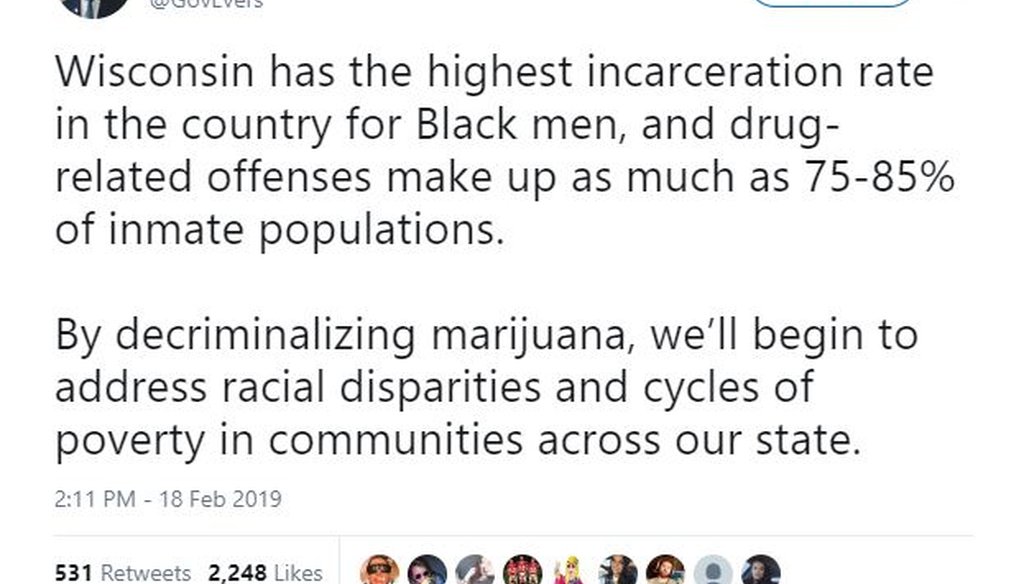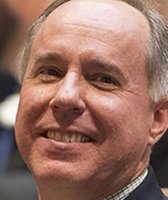Stand up for the facts!
Our only agenda is to publish the truth so you can be an informed participant in democracy.
We need your help.
I would like to contribute

Gov. Tony Evers said in a since-deleted tweet that 75-85 percent of Wisconsin prison inmates are there for drug-related crimes. Screenshot from Twitter.com
Readers of PolitiFact Wisconsin in February were drawn to a variety of topics, including Gov. Tony Evers' claim about prison inmate populations and a GOP lawmaker's claim about a tax plan.
Let's take a look at our five most-clicked items from the month:
1. Evers claims drug crimes account for 75 percent or more of state prison population. Not even close.
Evers' claim that "drug-related offenses make up as much as 75-85 percent of inmate populations" in Wisconsin was far and away the most popular topic in February.
In fact, Evers’ announcement that he would push to decriminalize marijuana in Wisconsin was one of the biggest splashes of his young tenure. It drew media coverage from across the country and sparked a war of news releases on the homefront.
Sign up for PolitiFact texts
Evers said Feb. 18, 2019, that his first budget would include proposals to legalize medical marijuana; allow possession of small amounts of marijuana for personal use; and expand the ability to expunge certain drug possession convictions.
But the governor's claim went awry with this:
"Reforming Wisconsin’s marijuana laws to align with the people’s support for medical marijuana is an important part of the governor’s plan," the release said. "But so, too, is addressing the social and racial justice aspect of marijuana use. Wisconsin has the highest incarceration rate in the country for Black men, and drug-related crimes account for as many as 75-85 percent of all inmates in our prisons."
When we asked Evers’ office for the evidence behind the drug offenses claim, Deputy Chief of Staff Melissa Baldauff said they made a mistake. Evers’ staff has since removed the statistic from the online version of the news release.
Current Department of Corrections data shows the actual number of prison inmates sentenced for drug offenses is a fraction of that number — about one-quarter of the prison population.
We rated the claim Pants on Fire.
2. Robin Vos, Scott Fitzgerald blame Tony Evers for Foxconn changes
Republican legislative leaders Robin Vos and Scott Fitzgerald were on the hot seat with a claim that potential Foxconn changes were due to "the wave of economic uncertainty" from the Evers administration.
In January 2019, the size and scope of Foxconn Technology Group’s planned complex in Racine County was suddenly up for debate, months after the Taiwanese firm signed contracts with state and local officials for billions in public funding.
Reuters reported Jan. 30, 2019, that Foxconn was reconsidering plans to make advanced liquid crystal display panels here and intending to hire mostly engineers and researchers, instead of the promised manufacturing workers.
The next day, the Nikkei Asian Review reported Foxconn planned to suspend and scale back its plans for the $10 billion plant in Wisconsin — a report the company disputed.
On the day the Reuters story appeared, Assembly Speaker Vos, R-Rochester, and Senate Majority Leader Fitzgerald, R-Juneau, released a joint statement that took aim at Democrat Evers, who had been sworn in a mere three weeks earlier.
"We don’t blame Foxconn for altering plans in an ever-changing technology business. It’s also not surprising Foxconn would rethink building a manufacturing plant in Wisconsin under the Evers Administration," the statement read in part. "The company is reacting to the wave of economic uncertainty that the new governor has brought with his administration. Governor Evers has an anti-jobs agenda and pledged to do away with a successful business incentive for manufacturing and agriculture."
When we asked Vos and Fitzgerald to back up their claim, Vos spokeswoman Kit Beyer noted a series of changes in Evers’ economic policy positions over time. But she said the pair had no direct evidence connecting Foxconn’s changes to Evers or any action by the new governor.
Meanwhile, the evidence against the claim was steep.
Published reports attributed the potential changes to an array of market and economic factors, including labor costs in the U.S., declining consumer demand and the trade war with China. Experts say those are historically the kinds of factors that drive business decisions, not politics.
The lawmakers' claim earned a Pants on Fire rating.
3. Wisconsin state Rep. John Nygren hits pay dirt with property tax claim
Many homeowners are currently receiving receipts stamped "Paid" in the mail for their 2018 property tax bills.
Whether the bill goes up or down each year is of paramount importance to homeowners.
So politicians are also eager to weigh in on the issue.
"Today, property taxes are lower than they were in 2010. Allowing taxpaying to keep more of their hard-earned money has been and will continue to be a top priority," state Rep. John Nygren, R-Marinette, said in a tweet.
Data from the Legislative Fiscal Bureau showed the statement generally rings true. But there have long been wrinkles on these claims -- from declining property values driving the drop to an increase in commercial and manufacturing property values shifting the burden from homeowners.
Those sorts of factors were still in play. According to the fiscal bureau, the change over the latest two years -- from 2017-18 to 2018-19 -- is a net decrease for homeowners, even though the gross tax bill is projected to increase.
What’s behind the difference? Funding for the lottery and gaming property tax credit increased by about $66 million, which contributed to the decrease in the median net tax bill.
We rated the claim Mostly True.
4. GOP leaders' claim that Foxconn won't get a dollar of taxpayer funds without jobs is on the money
A separate part of the Jan. 30, 2019 statement from Vos and Fitzgerald provided another claim we checked:
"From the very beginning, we looked out for the best interest of the taxpayers of the state," the statement read. "Not a dollar would be paid out until jobs in the Foxconn development area were created. The incentive package is based on fulfilling the contract."
When asked for backup, Vos spokeswoman Kit Beyer offered this statement via email:
"This part of the statement directly refers to the state incentives that were agreed to in the contract with Foxconn in the EITC (Earned Income Tax Credit) zone. No state tax dollars are awarded with sales tax break. And the bench marks that were set for the incentive plan that Democrats criticize were not met as outlined in the letter to WEDC (Wisconsin Economic Development Corporation)."
She also noted that Foxconn fell short of its job goals for 2018 and, thus, did not get the related state money.
Vos and Fitzgerald said "not a dollar" in state taxpayer money will be paid out "until jobs in the Foxconn development area were created."
While job-creation incentives have not kicked in, that only represents a portion of the state-level support -- and the company is already benefiting from the sales tax break on construction materials. In addition, the statement ignores costs to local taxpayers -- ones the company is also benefiting from already.
We rated the claim Mostly True.
5. Nygren: GOP tax plan "is better for working, middle-class families" making under $100K
An early skirmish between Wisconsin’s Republican-led Legislature and Evers revolved around competing tax cut plans.
With both parties maneuvering to frame their plan as best for the Average Joe, Nygren offered some numbers to support his case.
"Our plan is better for working, middle-class families; 88% of the tax relief goes to those making $100,000 or less," Nygren tweeted Feb. 12, 2019. "(Evers’) plan benefits higher income earners. Only 75% of the tax relief goes to those making $100,000 or less."
The numbers are accurate, so far as they go. The problem is they show only part of the picture.
The Democratic tax cuts are bigger overall — totaling $441 million compared to $338 million for the Republican plan.
So while a larger share of the GOP tax cuts would go to those making less than $100,000, the actual amount of tax savings for that group is lower.
The Democrats’ plan would save a total of $328 million for taxpayers making less than $100,000. The Republicans’ plan would save that group $297 million.
So the statement is partially accurate, but it leaves out important details. That’s our definition of Half True.
Our Sources
PolitiFact Wisconsin













































